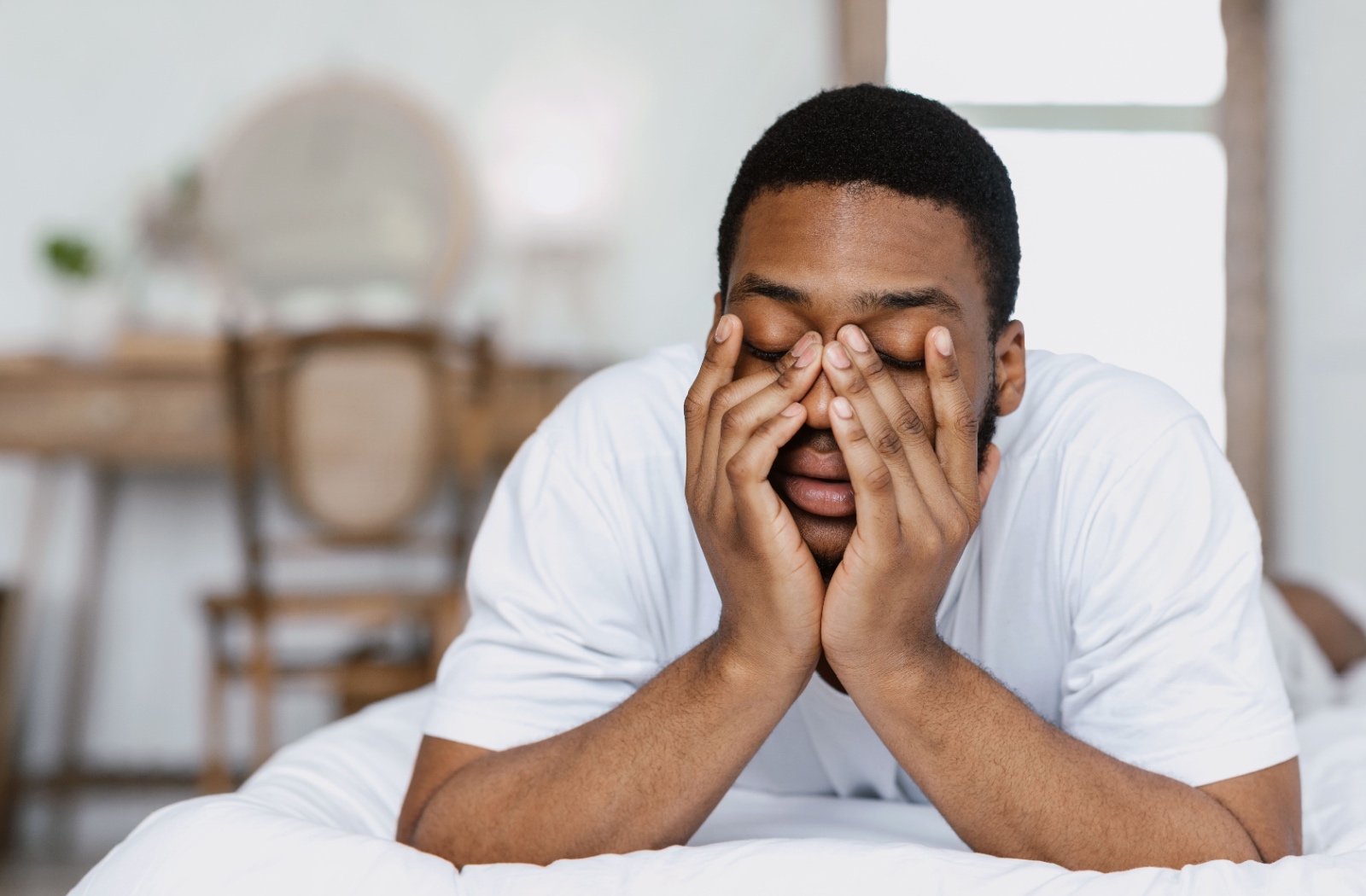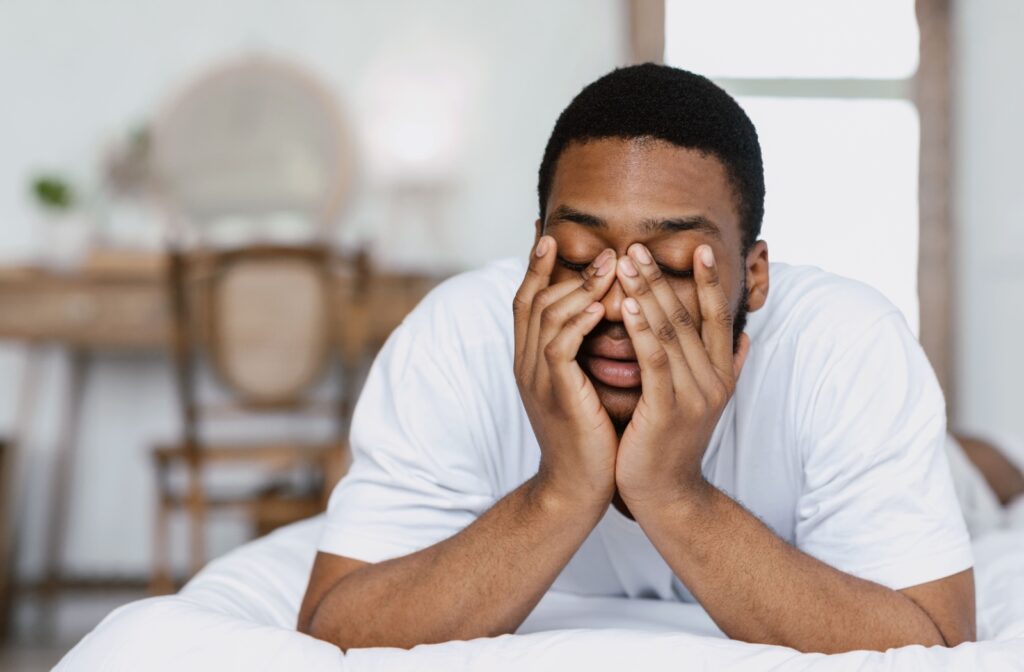Ideally you wake up in the morning refreshed with clear eyes—but this isn’t always the reality for many people. It’s more common than you may think to experience dry eyes in the morning, and there are a variety of possible reasons why.
Waking up with dry eyes is often caused by issues with tear production or tear quality, which can be exacerbated by sleeping in a dry environment, lifestyle habits, and certain medical conditions.
The first step in relieving dry eyes is determining the cause, which starts with an eye exam. Read more to find out what could be causing your dry eyes and how your eye doctor can help.
What Is Dry Eye?
Dry eye happens when your tears can’t adequately lubricate your eyes. This can lead to significant discomfort and other issues.
Symptoms can range from mild irritation to severe discomfort. Common signs include:
- A scratchy, gritty feeling
- Redness and inflammation
- Blurry vision, especially when looking at screens for a long time
- Watery eyes (due to your eyes overcompensating for dryness)
What Causes Dry Eyes in the Morning?
Dry eye can happen at any time during the day, but if you notice your eyes feeling especially dry in the morning, it may have something to do with your nighttime habits. Everything from medications taken before bed to the room you sleep in can play a role in morning dry eyes.
Environmental Factors
The environment you sleep in can significantly impact the moisture levels in your eyes. If you live in a dry climate or use air conditioning or heaters, you might be more prone to waking up with dry eyes. These factors can reduce humidity, causing your eyes to dry out.
Lifestyle Choices
Your daily habits can also contribute to dry eyes. Excessive screen time can reduce your blink rate, leading to less tear production. Additionally, sleeping with fans or air vents directed at your face can exacerbate the problem.
Contact Lenses
Contact lenses sit directly on the surface of the eye, which can limit the flow of tears and reduce oxygen availability to the cornea. Sleeping in contact lenses, even for a short duration, exacerbates this issue. It prevents natural tear production during the night and traps moisture beneath the lens, creating an environment conducive to dryness, irritation, and even infection.
While some people with dry eyes struggle to wear contact lenses comfortably even in the daytime, specialty lenses can help your eyes retain more moisture.
Medical Conditions & Medications
Certain medical conditions can make you more susceptible to dry eyes. These include Sjögren’s syndrome, rheumatoid arthritis, and thyroid disorders. Many medications can also inadvertently lead to dry eyes as a side effect, causing discomfort upon waking.
If you’ve started a new medication and notice increased dryness, it may be worth discussing with your healthcare provider to explore alternatives or additional remedies to help alleviate symptoms.
Allergies
When allergens such as pollen, pet dander, or dust mites are present in your sleeping environment, they can trigger an inflammatory response in the eyes, leading to symptoms like redness, itching, and irritation.
At night, when the body is less able to manage allergens, this can lead to a buildup of symptoms, resulting in dry, uncomfortable eyes when you wake up.
Nocturnal Lagophthalmos
Nocturnal lagophthalmos is a condition where individuals are unable to fully close their eyelids while sleeping. This leaves your cornea—the front surface of your eye—exposed without sufficient lubrication, resulting in dryness and irritation.
The Underlying Causes of Dry Eyes
Regardless of whether environmental or lifestyle habits are exacerbating dryness, persistent dry eyes are usually caused by either a lack of quality tears or tears evaporating too quickly. Each of these is triggered by an imbalance in 1 of the 3 layers of the tear film.
Inadequate tear production is a common underlying cause of dry eyes, particularly when waking up. This condition is referred to as aqueous-deficient dry eye, and can occur due to age, hormonal changes, or certain medical conditions that impair the tear glands’ ability to produce sufficient tears.
Tear quality is as crucial as tear quantity when it comes to maintaining healthy eyes, and if your tear film isn’t in balance, it can lead to evaporative dry eye. Factors such as meibomian gland dysfunction, environmental irritants, and certain health conditions can all play a role in this condition.
Tips to Prevent Waking Up with Dry Eyes
Making small changes to your sleeping environment and daily routine can make a big difference in dry eyes. Here are some habits to help improve your eye moisture:
Environmental Adjustments
- Use a humidifier in your bedroom to maintain moisture in the air.
- Avoid pointing fans or air vents directly at your face while you sleep.
Screen Time Habits
- Incorporate blinking exercises into your daily routine to keep your eyes moist throughout the day.
- Try the 20-20-20 rule: For every 20 minutes of screen time, take a 20-section break to look at something about 20 feet away.
- Maintain proper screen distance and lighting to reduce eye strain.
Dietary & Lifestyle Changes
- Include a diet rich in omega-3 fatty acids to support eye health (e.g., salmon, flaxseeds, walnuts).
- Stay hydrated by drinking plenty of water to help maintain tear production.
- Remove your contact lenses before sleeping, even if you’re taking a nap.
Professional Treatments for Dry Eye
While occasional dry eyes can often be managed with home remedies, persistent symptoms may mean you have a more serious case of dry eye. If you experience severe pain, significant vision changes, or persistent redness, it’s time to visit your eye doctor.
An optometrist can provide a range of treatments for dry eyes depending on the root cause of your symptoms. Several treatment options can provide relief, including:
- Radiofrequency (RF) treatments: RF treatment encourages collagen production and heat application stimulates the meibomian glands, which can improve tear quality and reduce tear evaporation.
- Intense pulsed light therapy (IPL): IPL uses specific wavelengths of light to target inflammation and improve meibomian gland function. This therapy helps to restore the natural balance of tears and alleviate discomfort associated with dry eyes.
- Zocular Eyelid System Treatment (ZEST): ZEST is a comprehensive treatment that combines eyelid cleaning, massage, and thermal therapy to enhance meibomian gland function. This system helps dissolve blockages and promotes healthier tear production.
Find the Cause of Your Dry Eyes
Dry eye is an uncomfortable condition that can seriously impact your daily comfort and quality of life. If you notice dry eyes in the morning consistently, consider incorporating some at-home practices to add moisture to your sleeping environment.
If your symptoms persist, Arc Eye Care is here for you. We can help determine what’s causing your dry eyes and recommend treatment options, whether the solution is lifestyle changes or in-office treatments. Visit our dry eye page to take our dry eye quiz, or contact us today to book an appointment.


